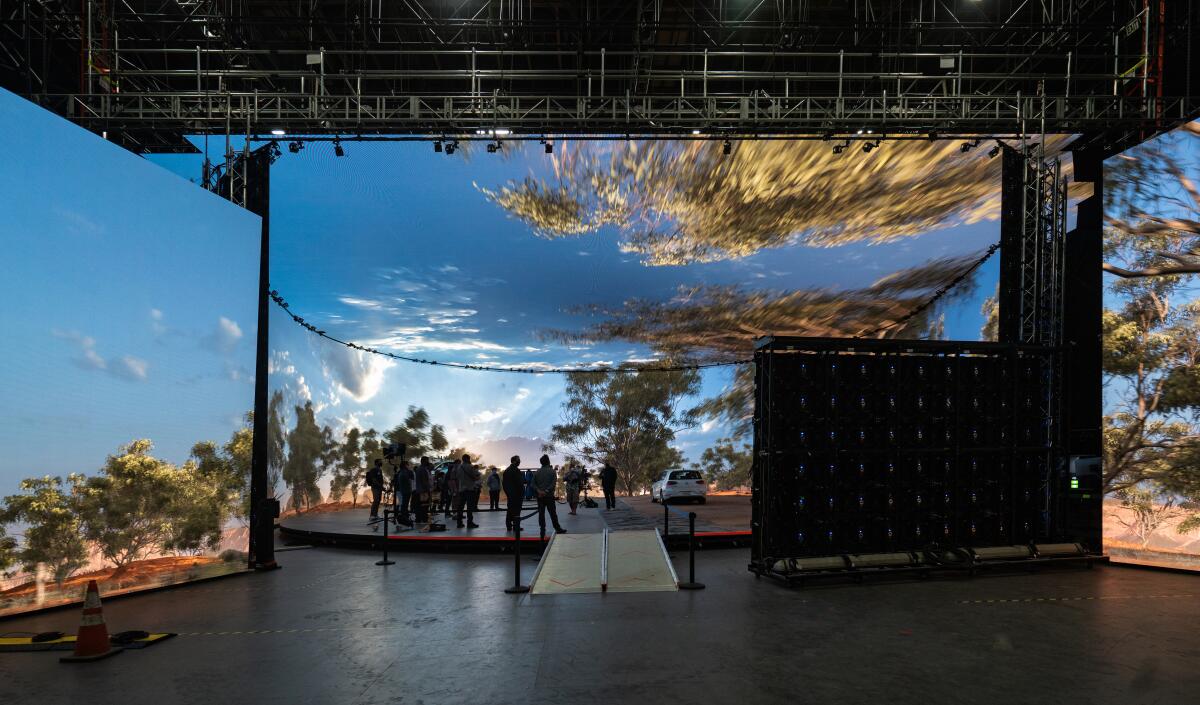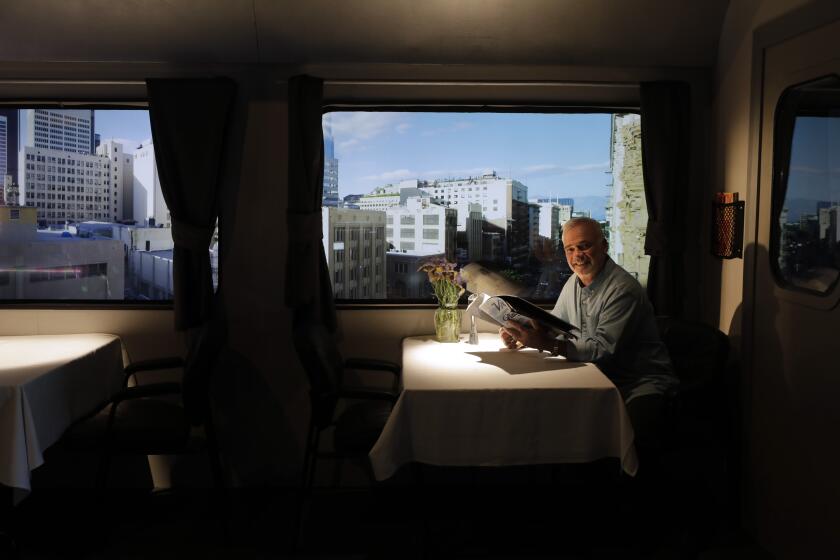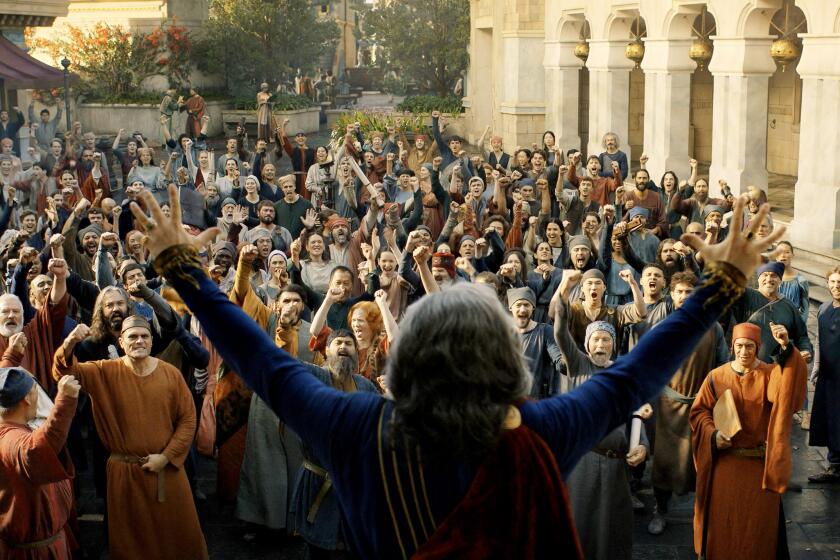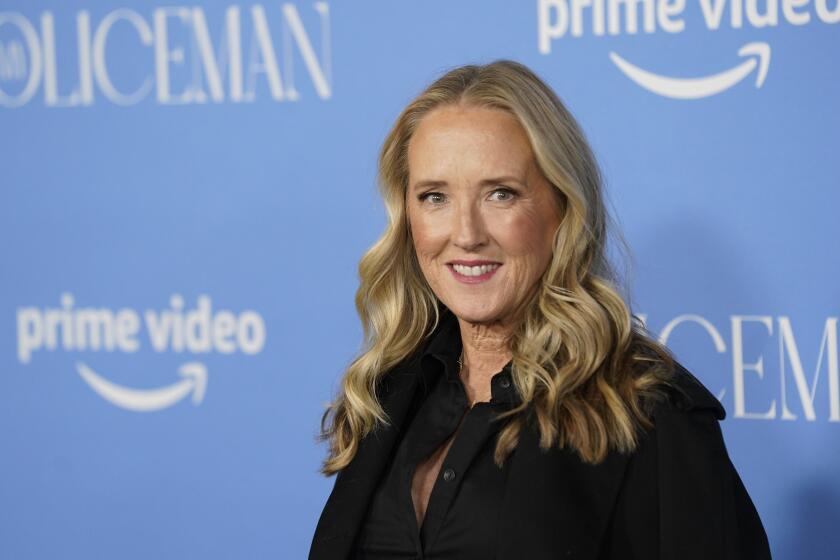Amazon Studios unveils massive virtual production stage, deepening ties to Culver City

- Share via
On Monday evening, filmmakers, directors and special effects artists ate shrimp cocktails and miso salmon as they wandered around Amazon Studios’ new 34,000-square-foot virtual production stage in Culver City.
Among them was director Reggie Hudlin, whose holiday comedy “Candy Cane Lane” starring Eddie Murphy will be the first movie to shoot on the stage. He cut a red ribbon with oversize scissors to formally open the studio Monday.
Stage 15, built in 1940 and once the home to movies like “It’s a Wonderful Life” and “RoboCop,” has been transformed into the largest virtual production stage in Los Angeles.
The revamped stage has a wall of more than 3,000 LED panels and motion capture cameras that re-create the outside world indoors and allow actors to interact with the environment rather than pretend in front of a green screen.
The stage is connected to the Amazon Web Services cloud ecosystem, so that shots filmed there are accessible to creative teams in real time in multiple locations.
“All these technical breakthroughs just allow for different kinds of storytelling that you couldn’t do before, maybe you couldn’t afford to go out to that location, or maybe it’s technically impossible. But now you can do it and it looks and feels real,” Hudlin said in an interview. He starts filming “Candy Cane Lane” next week and expects to be on the stage in February or March. “It means a lot to be able to work at home and have the world right here in a studio. I can go anywhere in the world or to other planets.”
With Stage 15, Amazon is marrying its technology and entertainment businesses and expanding its economic footprint in Southern California.
Powered by the latest in gaming technology, these stages allow filmmakers to cut costs by reducing the need to rebuild stages and giving them flexibility to film from any location with continuous daylight — regardless of the time of day.
“This whole investment that we’re making is consistent with who Amazon is,” Albert Cheng, vice president of Prime Video U.S., said in an interview. “We’re investing in new technology and we’re trying to figure out how to innovate around production using new technology.”
Amazon declined to disclose how much it spent on the stage, which is operated by a 20-person production team.
Planning for the project began back in the summer of 2020, as Hollywood was grappling with production shutdowns caused by the COVID-19 pandemic.
“The short-term challenge was how to safely shoot and create content with limited travel over the desire to shoot in multiple locations,” said
Chris del Conte, Amazon Studios’ global head of VFX. “The long-term challenge was how does the Amazon VFX department support and supply our filmmakers with the latest cutting-edge innovative technology to create a world within shows beyond the traditional green screen post process? Virtual production checked boxes for both those challenges and we began to utilize it.”
The studio started to use virtual techniques for productions such as the sci-fi series “Solos” starring Helen Mirren; and the Chris Pine movie “All the Old Knives,” where much of the shoot centered around a dinner at sunset.
Hollywood wants to get back to work but with the threat of COVID-19 unabated, producers are turning to virtual filmmaking to complete shoots
Virtual production technology uses advances in gaming software and goes beyond the use of green screens. Instead of performing against a static, blank screen, actors and crew on a virtual production stage can interact in real time within a three-dimensional environment projected on LED screens.
Walt Disney’s tale of an intergalactic bounty hunger, “The Mandalorian,” represents one of the most high-profile and expansive uses of virtual production. About half of the hit Disney+ series’ first season was shot against a 20-foot-high, 270-degree semicircular LED video wall at Manhattan Beach Studios.
The ability to cut location costs and re-create scenes from anywhere has made the technology increasingly popular among filmmakers.
Streaming services have also helped fuel a boost in virtual productionas they seek to increase their content libraries, especially as adventure, action, sci-fi, and fantasy are popular among viewers, according to a report by Deloitte.
Last year, Netflix purchased Vancouver visual effects company Scanline VFX. Netflix shows that have used virtual production stages include the drama “1899” in Berlin and the sci-fi film “The Midnight Sky” in the United Kingdom. The streamer also utilized virtual production in L.A. for some of the driving sequences in the movie “Blonde.”
Amazon has spent more than $700 million for the first season of “The Lord of the Rings: The Rings of Power,” a high priority for founder Jeff Bezos.
Amazon’s virtual stage also deepens its ties to Southern California.
Since announcing it was moving its headquarters to Culver City in 2017, Amazon Studios has expanded its footprint locally, with roughly 630,000 square feet in the city, according to CoStar, which tracks real estate data. Amazon has also diversified the type of content it distributes, becoming the home of “Thursday Night Football” and making big bets on original shows like “The Lord of the Rings: The Rings of Power” in an effort to encourage consumers to buy Prime memberships.
Earlier this year, Amazon closed on a $8.5 billion deal to buy MGM, including its library of content of movies including the James Bond franchise.
There are more than 200 million Prime subscribers worldwide, and more of its customers are signing up because of video content, Amazon Chief Executive Andy Jassy said at a New York Times’ DealBook summit discussion last week.
“I do think over time we have opportunities to make our Prime Video business a standalone business that has very attractive economics,” Jassy said.
Amazon Studios’ success could also benefit Culver City, where it is one of the largest employers, with roughly 2,700 staffers, according to the city.
“More content, more investment, benefits the city in the long run,” said Mayor Daniel Lee.
“Amazon’s investment in virtual production is promising if it takes off and Amazon becomes the leader in the space,” said Ryan Patap, senior director of market analytics for CoStar Group. If it is successful, he added, “it is likely to draw more businesses to Culver City.”
Jennifer Salke, who has led Amazon Studios since 2018, has now expanded her role nearly nine months after Amazon’s acquisition of MGM.
More to Read
Inside the business of entertainment
The Wide Shot brings you news, analysis and insights on everything from streaming wars to production — and what it all means for the future.
You may occasionally receive promotional content from the Los Angeles Times.















